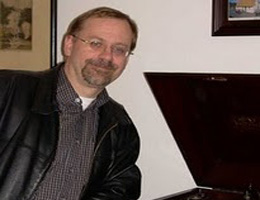
The Lee Boys: Live on the East Coast ‘more than blurs the line between the sacred and the secular—-it erases it altogether.’
By Bob Marovich
LIVE ON THE EAST COAST
The Lee Boys Live on the East Coast
M.C. Records
Live on the East Coast, the Lee Boys’ first album since 2012’s Testify and the group’s first for Mark Carpentieri’s M.C. Records, is a smoking hot sanctified-meets-steel workout.
Recorded in late 2018 at three live appearances—-Virginia, Florida and North Carolina—-Live on the East Coast could just as easily have been titled Live in the Southeast. Name aside, the album combines traditional gospels and spirituals, newly-composed songs such as the title track from the group’s Testify album, and soul classics such as the Staples’ “I’ll Take You There” and a bouncy cover of Bobby Blue Bland’s “Turn On Your Love Light.” The live environment delivers additional voltage to what would have already been electrifying performances.
The Lee Boys, like the Campbell Brothers, introduce a church-based music into the mainstream. Their roots are from the House of God, where their father, Elder R. E. Lee, was a pastor and their uncle, Lorenzo Harrison, a sacred steel player. This distinctive string-based sound, as sacred steel authority Robert Stone explains in the album notes, was popularized in the Church of the Living God.

‘In the Morning,’ The Lee Boys, from Live on the East Coast

‘Come On Help Me Lift Him,’ The Lee Boys, from Live on the East Coast
Like the Hammond B3 organ, the electric guitar and petal steel evoke the sounds of souls surrendering to the spirit in wails of praise, keening, moaning and shouting. “Come On Help Me Lift Him Up,” composed by Alvin Lee, is a rollicking example of the kind of steel guitar work one would hear in the Church of the Living God.
Examples of traditional fare include the opening congregational chestnut “In the Morning” (aka “In the Morning When I Rise”). The ensemble delivers a healthy dose of gospel blues on the classic Brother Joe May selection, “Don’t Let the Devil Ride.” They also perform “You’ve Got to Move,” a song associated with Reverend Gary Davis and Mississippi Fred McDowell, with equal parts Pentecostal conviction and Sun Studios rockabilly.
Alvin Lee and guest artist Rick Lollar’s electric guitars sting as much as does Chris Johnson’s petal steel. They are delicious together.

‘Turn On Your Love Light,’ the Bobby Blue Bland classic as performed by the Lee Boys on Live on the East Coast

‘You Got to Move,’ the blues evergreen popularized by Rev. Gary Davis and Mississippi Fred McDowell–ad well as the Rolling Stones–as performed by the Lee Boys on Live on the East Coast
The Lee Boys in live appearance bathe religious and inspirational messages in jam band rock ‘n’ roll. As such, they introduce fans of the music made by the other Alvin Lee, the late lead singer and guitarist of the British blues-rock legends Ten Years After, to the soundtrack of the Pentecostal church.
Live on the East Coast will appeal to sacred steel fans, naturally, but it also stands to gain a following among those who love a good jam band. The album more than blurs the line between the sacred and the secular—-it erases it altogether.
 Bob Marovich is a gospel music historian, radio announcer and author. His “Gospel Memories” radio program of vintage black gospel music and artist interviews airs live first Sundays from 3 a.m. to 7:30 a.m. on Chicago’s WLUW 88.7 FM, and streams live at the station’s website. Snippets of recent broadcasts can be heard online at the Gospel Memories Radio Show. Bob is also the founder and editor of The Black Gospel Blog, now the Journal of Gospel Music, the source for the reviews published here with Bob’s permission. Bob launched JGM on the tenth anniversary of The Black Gospel Blog, which he founded July 28, 2004, as the first blog to cover African American gospel music. His first book, Shout Troubles Over: The Birth of Gospel Music in Chicago, is scheduled for publication in March 2015 by the University of Illinois Press as part of its Music in American Life Series. Bob lives in Chicago with his wife, author Laurel Delaney, and their two cats.
Bob Marovich is a gospel music historian, radio announcer and author. His “Gospel Memories” radio program of vintage black gospel music and artist interviews airs live first Sundays from 3 a.m. to 7:30 a.m. on Chicago’s WLUW 88.7 FM, and streams live at the station’s website. Snippets of recent broadcasts can be heard online at the Gospel Memories Radio Show. Bob is also the founder and editor of The Black Gospel Blog, now the Journal of Gospel Music, the source for the reviews published here with Bob’s permission. Bob launched JGM on the tenth anniversary of The Black Gospel Blog, which he founded July 28, 2004, as the first blog to cover African American gospel music. His first book, Shout Troubles Over: The Birth of Gospel Music in Chicago, is scheduled for publication in March 2015 by the University of Illinois Press as part of its Music in American Life Series. Bob lives in Chicago with his wife, author Laurel Delaney, and their two cats.


